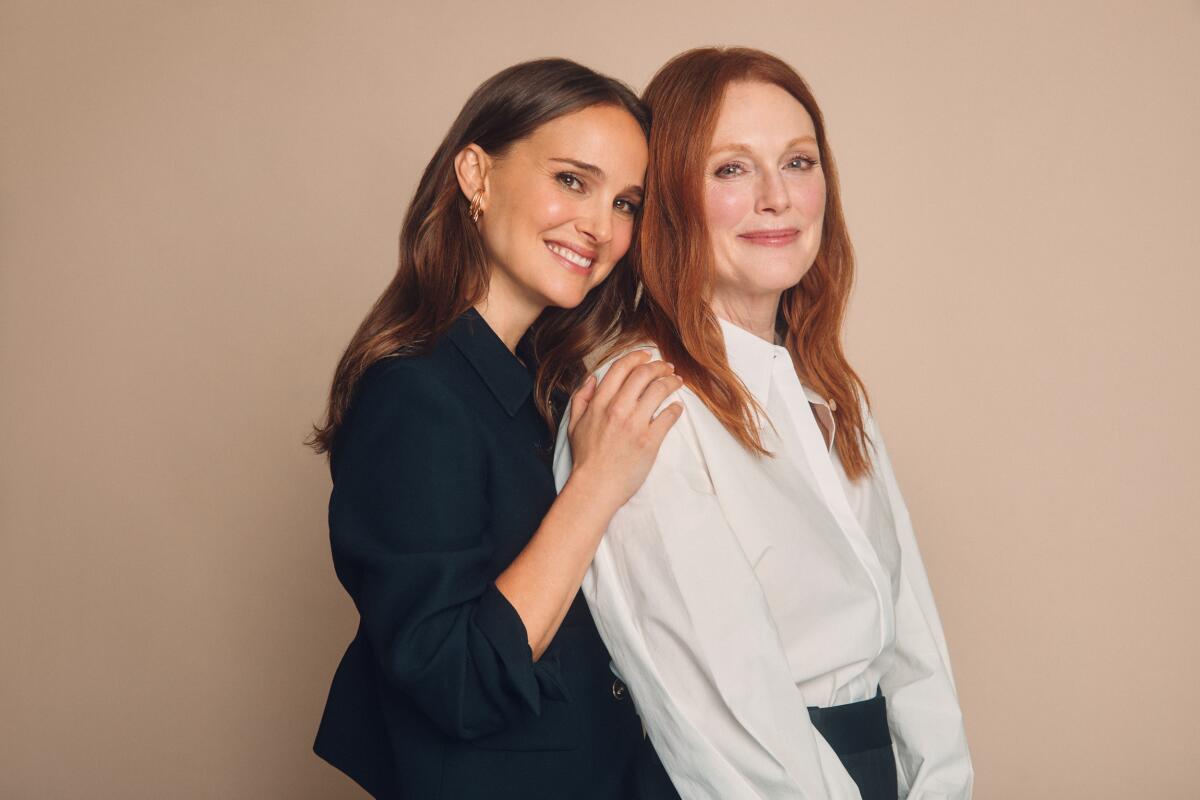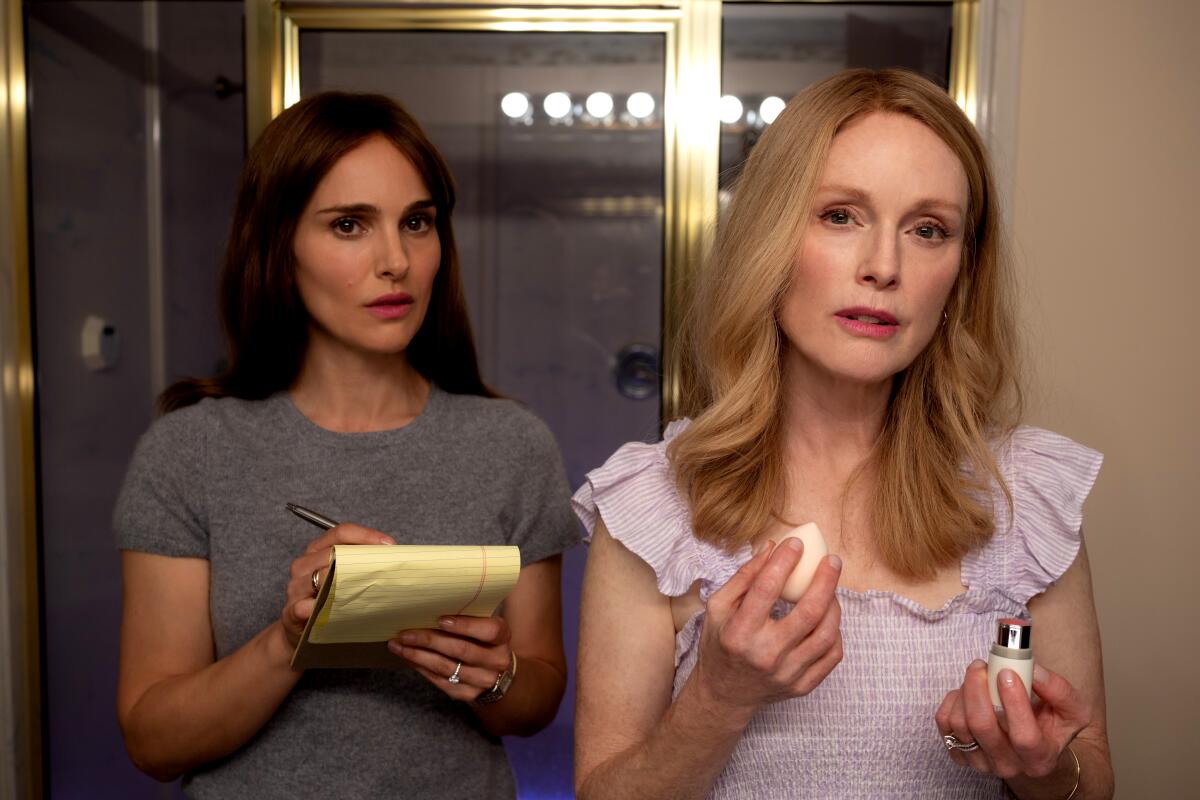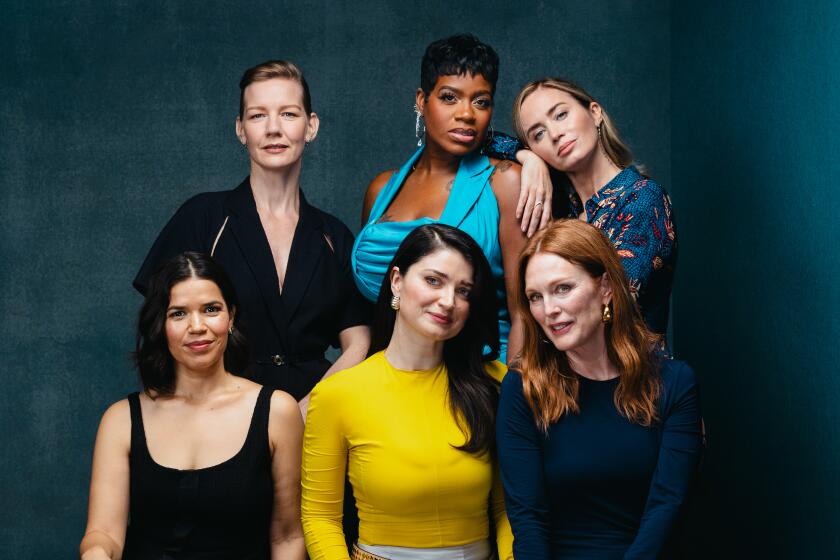Natalie Portman, Julianne Moore relish the idea of a film with two key roles for women

- Share via
The most pivotal scene in Todd Haynes’ “May December” had no rehearsal and very few takes. A psychological drama about an actress, Elizabeth (Natalie Portman), who enters the world of Gracie (Julianne Moore), an older woman who, decades earlier, created a tabloid scandal by initiating a sexual relationship with a 13-year-old, “May December” generates considerable friction from Elizabeth’s desire to study Gracie in order to play her in a movie. That tension comes to a head when the two women stand together in Gracie’s bathroom, Gracie showing Elizabeth her makeup routine. Shockingly intimate, the single-shot scene finds the two characters metaphorically melding into one, Gracie delicately applying lipstick to Elizabeth so that they look similar.
“It’s a moment when they’re both trying to get really close to each other, and you don’t know what’s going to happen,” Moore says, sitting on a couch in a Sunset Strip hotel with her co-star. “It feels seductive. It also feels dangerous.”
Fantasia Barrino, Emily Blunt, America Ferrera, Eve Hewson, Sandra Huller, Julianne Moore offer insights into their work.
Portman nods in agreement, their rapport far warmer than their characters’ in the movie chronicling a fraught power struggle between actress and reluctant subject. It was a project Portman (who also serves as a producer) had wanted to make, sending Samy Burch’s screenplay to director Haynes, hoping it would spark something in him too.
“I had always dreamed about working with Todd,” she says. “I’m such an enormous admirer of his — his brain, his vision, his way of seeing the world. I had sent him things before that he had not taken to. But I thought he would be a brilliant mind to make this come to life.”
She and Moore knew each other — they had an especially great time hanging out at a Stevie Wonder concert in London — but they’d never worked together, largely because of how Hollywood operates. “It’s so rare to have two female roles [in the same film] that are not related to each other,” Portman says. Jumping in, Moore adds, laughing, “It’s usually a family dynamic or they’re in love with each other.”
On the surface, the brittle, defensive Gracie recalls Moore’s previous indelible collaborations with Haynes on “Safe” and “Far From Heaven,” the Oscar-winner portraying sheltered women trapped in a rarefied bubble. But Moore doesn’t see her characters that way.

“I wouldn’t use the word ‘bubble,’ because I don’t think they’re in there by themselves,” says Moore. “I think Todd and I are interested in culture and society and identity. We’re interested in people who are responding to the world that they are born into — how they succumb to it, how they react against it or how it shapes them. Sometimes, I wonder if there really is any identity at all or if it’s just culture. Like, who are you? It’s almost impossible to define yourself without something opposite you.”
For Portman, who earned an Academy Award playing an unsettlingly committed ballerina in “Black Swan,” Elizabeth presents another opportunity to investigate an artist who goes to extremes to achieve greatness. Asked if that’s coincidence or by design, Portman replies, “Performance has been central to my curiosity — how it relates to identity and how it relates to self, the public and the private. I’m sure being a public person from a very young age influenced my interest in it. It’s something I return to a lot.”
“May December” is filled with musings on self-deception, especially with Gracie, who’s raised a family with Joe (Charles Melton), clinging to the belief that their long-ago illicit love affair is now a healthy, happy marriage. Moore adored Burch’s script but initially struggled to penetrate the character’s mind-set.
“But then I realized that she’s someone who’s swallowed this narrative of being a princess. She feels like she was rescued from her life by her prince — but her prince happened to be 13 years old. To do that, you have to elevate that prince to be your man when they’re a child, and so she remains a child.” As a result, Moore decided that Gracie needed a lisp. “A lot of people who have lisps are not children — they simply have a speech thing,” she says. “But we associate that with a childlike quality.”
“I can only imagine how scared Joe was,” the actor says of his character. “There’s something beautiful about his strength.”
It also gave Portman something physical that Elizabeth could imitate as she begins becoming her subject. “That’s Julie’s genius,” Portman says, “and her generosity. She didn’t have to think about that [for me] — she could have just been like, ‘Good luck!’”
Both actresses have played real people, so they have experience with the sort of transformation that Elizabeth is attempting. So how accurate is the film’s portrait of her vampiric feasting on Gracie’s essence?
“You’re looking into someone’s heart, but you’re also using their emotions and story as raw materials,” Portman suggests. “I think all artists have that question of ‘What is that, ethically, to take someone’s feelings and turn it into entertainment?’ Obviously, I don’t think most actors’ processes cross the lines that Elizabeth’s does. But it’s very close to questions of journalism and documentary — when does depicting someone change the course of their life? Which is very embedded in the story of this movie — Gracie and Joe’s life has been completely changed by being portrayed. It’s almost impossible to make someone the subject of a story without impacting their lives. How much you impact is, obviously, up to the individual.”
During the conversation, Portman and Moore frequently exchange compliments, clearly pleased that they were finally able to team up. As much as their characters hide behind masks, these two are unreserved in their praise. “[Gracie] couldn’t be farther from Julie,” Portman insists. “There’s nothing that distinguishes Julie more than just being considerate and empathetic to everyone around her — and then this character has no empathy.” She turns to her co-star: “I was like, ‘Oh, this must be joyful,’ because it’s just the opposite of who you are.”
Moore considers that for a moment. “Well, you are playing, right? So there’s joy in playing it,” she replies, before looking at me. “That’s where Natalie and I are very similar — I think that we take our work very seriously, but we don’t take ourselves very seriously. It’s easy for us to engage in this work in a playful way — because it should be.” Moore’s eyes get big and excited. “We’re making a movie. It should be joyful.”
More to Read
From the Oscars to the Emmys.
Get the Envelope newsletter for exclusive awards season coverage, behind-the-scenes stories from the Envelope podcast and columnist Glenn Whipp’s must-read analysis.
You may occasionally receive promotional content from the Los Angeles Times.












